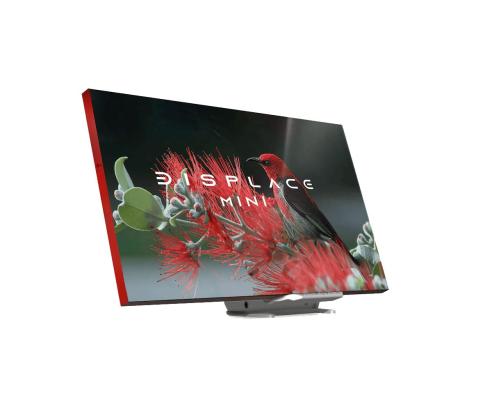ARTICLE AD

At CES 2023 a startup hardware company called Displace launched the 55-inch ‘Display Flex’, a “wireless” $3,000 4K OLED TV which sticks to walls without a traditional mounting. The launch created a sensation at the time, and today at Mobile World Congress in Barcelona I caught up with founder and CEO Balaji Krishna, who told me that more versions of the screen are on their way, and with new features inside.
To begin with, the new ‘Display Mini’ will be a smaller 27 inch TV and designed for a kitchen or bathroom space.
Krishna also hinted at new, yet-to-be-revealed tech built into the device such as an “AI-powered shopping engine” letting consumers purchase products from ads, and a contactless payment reader.
The Displace devices will also have a Thermal camera built-in that has potential health applications (like reading your body heat maps to detect inflammation etc.), according to the company.
TechCrunch wasn’t able to verify all these new features so we’ll have to wait for the shipped product to kick the tires on these new capabilities.
“We stopped taking pre-orders after CES because we wanted to actually fulfil those pre orders, and we’re going to be starting to ship those mid-year,” Krishna said. “We made a lot of design changes and simplifying a lot of stuff, such as reducing the weight.”
He added the company is aiming to do a “small series A” fundraising round of $5 million.
He said that most interest for the device had come from art studios, museums, and “even embassies”. While most consumers are fine with a traditional TV setup, it’s businesses that need to be able to mount a TV on a wall, or even a window, as Displace is capable of doing.
How does the TV actually work? Well, it uses a vacuum suction system to attach, even to a dry wall, as well as swappable batteries that power the screen. The TV is portless and streams all content from a base station, similar to LG’s OLED M.
As well as being able to stick to ceramic and glass, the Display Flex will stay on the wall for up to 10 months, using its vacuum system. And should that fail, the screen will gradually lower itself using a zipline – like a spider walking down a web – from the wall.

 8 months ago
47
8 months ago
47 


